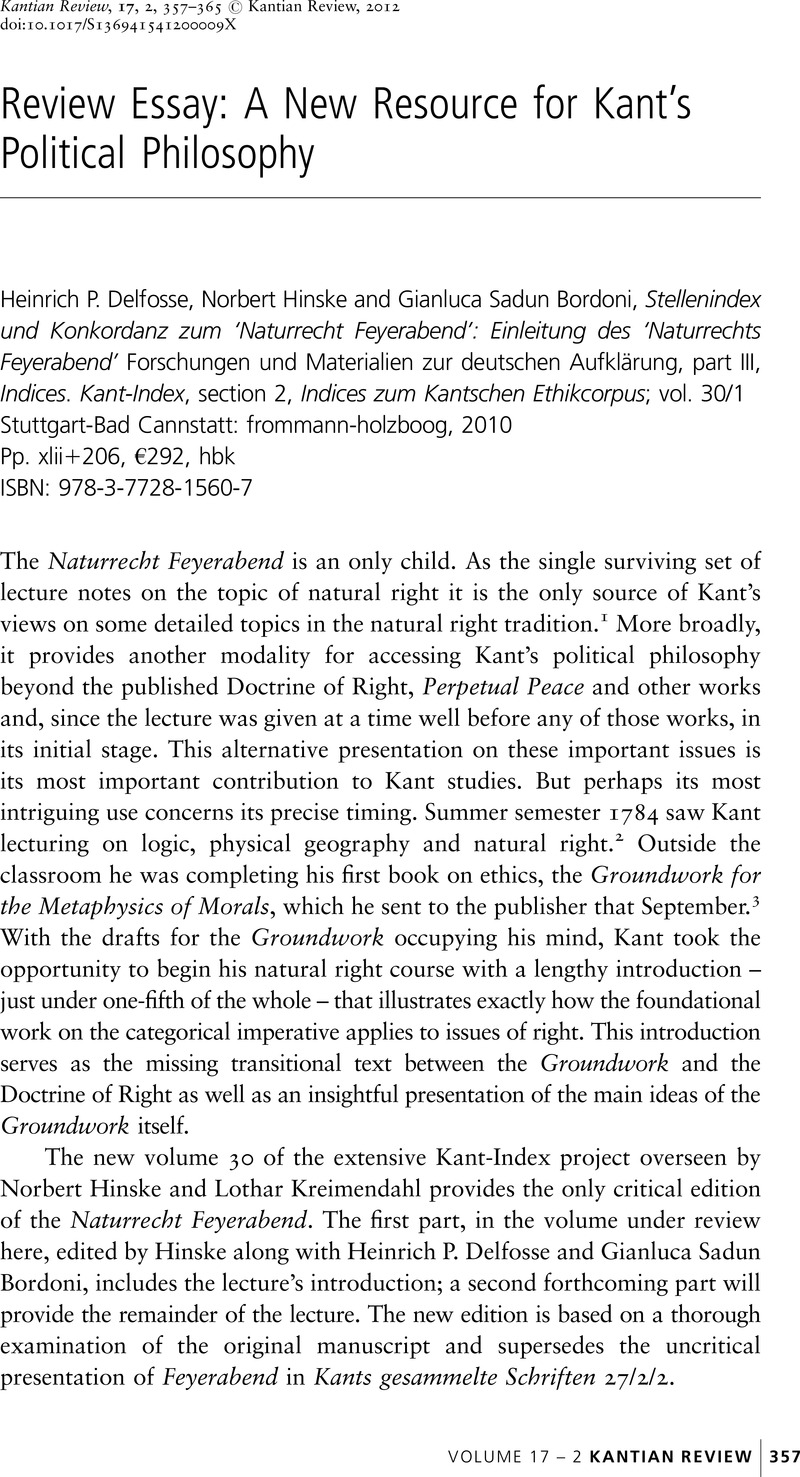No CrossRef data available.
Article contents
Review Essay: A New Resource for Kant's Political Philosophy - Heinrich P. Delfosse, Norbert Hinske and Gianluca Sadun Bordoni, Stellenindex und Konkordanz zum ‘Naturrecht Feyerabend’: Einleitung des ‘Naturrechts Feyerabend’ Forschungen und Materialien zur deutschen Aufklärung, part III, Indices. Kant-Index, section 2, Indices zum Kantschen Ethikcorpus; vol. 30/1 Stuttgart-Bad Cannstatt: frommann-holzboog, 2010 Pp. xlii+206, €292, hbk ISBN: 978-3-7728-1560-7
Published online by Cambridge University Press: 08 June 2012
Abstract

- Type
- Reviews
- Information
- Copyright
- Copyright © Kantian Review 2012
References
1 Naturrecht, like Recht, can be translated using right or law. Naturrecht is better known to the scholarly world as ‘natural law’, in Kant's time the dominant scholarly approach in Germany to law and political institutions. Here I use right to maintain connection with Kant's other uses of Recht and consistency with the Cambridge Edition of Immanuel Kant.
2 The best source for information about Kant's teaching, including semester-by-semester lists of courses he taught, the textbooks he used and the status of student notes of Kant's lectures is Steve Naragon, Kant in the Classroom (http://www.manchester.edu/kant/Home/index.htm). Gottfried Feyerabend is the author of one of only two student notes from Kant's natural right courses known to exist. The other set, taken by Friedrich von Gentz, was in private hands but was lost well before it could be published. See also Werner Stark, Kant Information Online (http://www.online.uni-marburg.de/kant/).
3 Johann Georg Hamann letter to Johann George Scheffner, 19–20 Sept. 1784, ‘Kant has sent off the manuscript of his Groundwork for the Metaph. of Morals’. In Immanuel Kant im Rede und Gespräch, ed. Rudolf Malter (Hamburg: Felix Meiner, 1990), p. 257.
4 Kants gesammelte Schriften, vol. 27/2/2, ed. Gerhard Lehmann, Akademie der Wissenschaften zu Göttingen (Berlin: Walter de Gruyter, 1979), p. 1052.
5 I am completing a translation into English of the entirety of Naturrecht Feyerabend for inclusion in Immanuel Kant, Lectures and Drafts on Political Philosophy, in the Cambridge Edition of the Works of Immanuel Kant (forthcoming), initially using my own inspection of the manuscript with some assistance from Werner Stark of the Marburg Kant Archives. Gianluca Sadun Bordoni has published a commentary and translation into Italian of the introduction based on his own inspection of the manuscript: Kant e il diritto natural: L'Introduzione al Naturrecht Feyerabend (Rivista internazionale di filosofia del diritto, 84 (2007), pp. 201–81) and is preparing a translation of the remainder. Fernando Costa Mattos published a translation into Portuguese of the introduction to the course lecture in Cadernos de filosofia Alemã, 15 (2010) and is preparing a translation of the remainder. Mattos is working as part of a team of translators led by Ricardo Ribeiro Terra. Our translations in progress will follow the new Kant-Index edition.
6 In a discussion of a sovereign's alleged defence of taking the nation to war on the basis that citizens are akin to the sovereign's property, Kant notes that citizens must be regarded ‘not merely as means, but also as ends in themselves’ (6: 345). He also struggles to defend his category of ‘a right to a person akin to a right to a thing’ which allows making ‘direct use of a person as of a thing, as a means to my end, but still without infringing upon his personality’ (6: 359).
7 In the introduction to the Doctrine of Virtue Kant associates right with the mere formal condition of ‘consistency of outer freedom with itself if its maxim were made universal law’ (6: 380, cf. 6: 396), while associating virtue with ends that are also duties, although identifying the latter not with humanity as an end in itself but with the ends of one's own perfection and the happiness of others.
8 Letter 126a, to Johann Friedrich Fetter, 28 April 1784, not found in Kants gesammelte Schriften but in Immanuel Kant, Briefwechsel, selected und annotated by Otto Schöndörffer, ed. Rudolf Malter, 3rd expanded edn (Hamburg: Felix Meiner Verlag, 1986), pp. 933–4.
9 The argument is interesting in itself, but must be compared to his later argument in the Doctrine of Right that the state has the right to impose taxes on some in order to provide for the preservation of the poor and foundlings (6: 325–7). Part of Kant's justification for taxation in support of the poor and foundlings concerns not the duty of individual citizens but the duty of the sovereign to tax the people for ‘its own preservation’ (6: 325–6). Yet he then moves from this collective preservation of the people to the particular preservation of individual poor and foundlings. The relevance of Feyerabend to this argument would be whether the indeterminacy of the means for self-preservation does or does not prevent concern for the welfare of others to have a place in a legal system.




